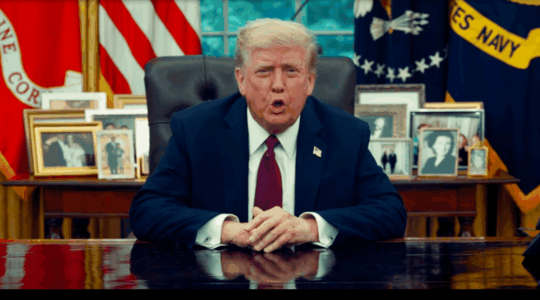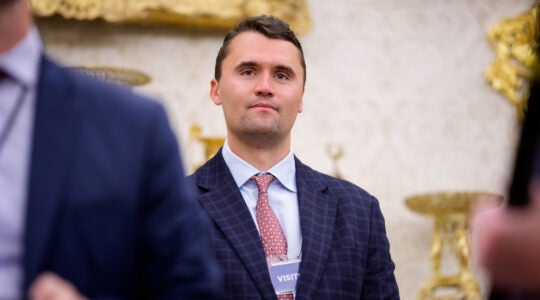WASHINGTON, Jan. 18 (JTA) Budget time could be crunch time, Democrats are telling American Jews. In two weeks, President Bush will present his first budget to the new Democratic-controlled Congress. Democrats expect more tax cuts, and say that after six years of acquiescence to administration budgets by Republican-dominated Congresses, they plan to put up a fight and they want Jewish backing.
“The reality is that this administration has proposed and succeeded in passing tax cuts of $2 trillion since it took office,” said Tom Kahn, majority staff director of the U.S. House of Representatives’ Budget Committee. “This means that there are less resources for critical services. It’s a zero sum game: I would hope that the Jewish community recognizes these tax cuts come at a significant cost.”
Kahn, who doubles as president of the American Jewish Committee’s Washington chapter, predicted further cuts in programs U.S. Jews consider essential, including Medicare for the elderly and Medicaid for the poor.
“Democrats, and we expect many Republicans, are going to be fighting very aggressively to protect the services that are important to the Jewish community,” he said.
The Iraq war in particular is consuming the national treasure, Kahn said.
“It’s a tough fiscal environment because the war is a phenomenally expensive operation, and every penny is being added to the deficit,” which now stands at almost $250 billion, he said. “Deficits are projected for at least the next five years.”
Democrats say it’s an echo of the message Rep. Henry Waxman (D-Calif.) delivered to major givers attending a United Jewish Communities event over the summer: The community can no longer afford to advocate for social-service spending while remaining coy about tax cuts.
A number of major Jewish givers have fought in recent years against attempts to criticize tax cuts, preferring to emphasize the funding Jewish social-service groups seek. UJC lobbying focuses on maintaining funding for Medicare, Medicaid and other programs.
Some of the more liberal, activist sectors of the community have opposed tax cuts, including the Reform movement and the National Council of Jewish Women.
More reticent are those groups especially UJC that lobby both parties day-to-day for funding for favored programs.
The logic behind the reticence is that support for or opposition to tax cuts breaks along sharply partisan lines, while support for specific social-assistance programs crosses party lines.
Still, the Jewish community could become more vocal if, as expected, Bush proposes making permanent a number of tax cuts due to expire by 2010, said Hadar Susskind, Washington director of the Jewish Council for Public Affairs, the umbrella body for local Jewish community relations councils.
“A lot of people are having that discussion, saying we want all these things, but we’ll have to address the totality of it and see where the money is,” Susskind said.
The key is the major donors, many of whom are Republican and who until now have adamantly opposed taking a stand on tax cuts.
“I don’t see those people jumping out right now with vocal statements about tax cuts, but there is a possibility they will later on because many of those people care deeply about the programs,” he said. “It’s not an easy process.”
Democrats say failing to take a stand could be embarrassing for the community, especially while the president is asking for more money for the Iraq war.
“They want money for the NORCs,” or Naturally Occurring Retirement Communities, a program pioneered by UJC that allows the elderly to live closer to family. “But where is it supposed to come from?” one Democrat asked. “From the troops?”
Matt Brooks, executive director of the Republican Jewish Coalition, said that advocating against tax cuts would be a tactical error.
“The fire in the engine of this economy is the fact that we’ve been cutting taxes,” he said. “That has primed the pump.
Opposing making the tax cuts permanent, Brooks said, “would have a disastrous effect on the health of the economy.”
Brooks suggested that the community back bipartisan efforts to roll back earmarks, the spending amendments lawmakers attach to bills.
“There’s so much waste on pork, let’s make a concerted effort,” he said.
That might be a stretch: Many of the programs UJC favors, including NORCs and programs that streamline the bureaucracy for those who care for elderly relatives, come from earmarks.
For now the UJC is not overly concerned, said William Daroff, its Washington office director. Bush is still considering his budget, Daroff said, and by no means is it certain that the tax cuts are in. Even if they are, they stand little chance of emerging intact from the House’s Ways and Means committee
“There won’t be the votes for it,” he said. “I don’t know how necessary it is to expend political capital to oppose the president’s budget.”
On the other hand, attempts to cut Medicare for the elderly or Medicaid for the poor will be vigorously opposed, Daroff said.
“The Jewish community will stand up loudly and oppose those cuts,” he said.
JTA has documented Jewish history in real-time for over a century. Keep our journalism strong by joining us in supporting independent, award-winning reporting.





